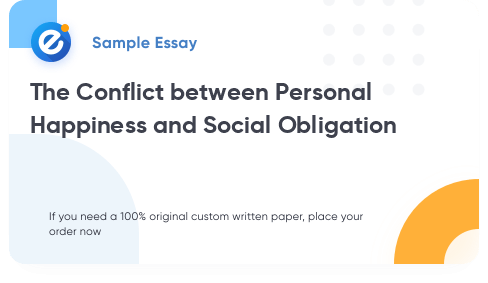
Introduction
Each distinct society has a unique definition of roles and obligations that are imposed upon its members. These are often based on the social constructions of individual positions and capabilities that shape the expectations that the society has of these individuals. As a result, the obligations placed upon an individual by the society, in which they live, may not be in line with their personal definition of happiness. In most cases, the concept of happiness is relative and defined either by the social constructs or individual needs.
In the Double Suicide, the difference between the social obligations of the two lovers and their personal happiness is what leads them into the tragedy that concludes their love story. They felt that they had no choice in defining their fate, and thus suicide would be a way to cheat this fate and create a new opportunity of being together in the next life. From this story, it is clear that the conflict between personal happiness and social obligation is a serious one, and it needs careful consideration given its potential to destroy young lives as it did in this case. In order to understand this conflict, it is important to consider both personal happiness and social obligation as independent concepts within the society in the context of Jihei and Koharu’s experiences.
Calculate the cost of essay
Social Obligations
Modern society has created or defined a number of expectations that the people must meet depending on their age, gender and profession. In eighteenth-century Japan, where the movie is set, the courtesans were viewed as slaves belonging to their masters and brothel owners. They were not able to leave unless they could buy their own freedom, whish was often set at a very steep price to prevent them from leaving in the first place. Koharu was a courtesan, and thus unable to break free from her master. The expectation or obligation placed on her by social construction was thus that of serving her master in the brothels and making him rich.
Jihei was, on the other hand, a married paper merchant with some money to spend. After falling in love with Koharu, he spends all his money with her in the brothel, and in the end, cannot afford to buy her freedom either. As a married man, Jihei also has to stay with his wife and children, and thus is unable to stay with his love. The society of those days had it that a married man was obliged to stay by his wife’s side, and this is clear when Jihei’s wife asks Koharu to stay away from her husband. In both cases, the society has different expectations of the two lovers, and they evidently have to be apart to meet each of their obligations.
Limited Time
special offer
Personal Happiness
Koharu was a prostitute, at the time known as a courtesan. This made her practically a slave with no will of her own. She had to do her masters’ bidding at the brothels and shun her own needs and expectations. Considering that personal happiness is all about catering to one’s own needs and expectations, it can be stated that her profession was her greatest stumbling block to her own personal happiness. After meeting Jihei, she wanted to be more than just a courtesan entertaining customers at the brothel. She felt she had a chance to be a decent woman, happy and loved by one man. The obstacle in her way, however, was too great to overcome except by taking her own life.
Jihei, on the other hand, is a married man with two children, but he falls in love with a young woman who works as a courtesan. His personal happiness depends on his ability to be with the woman of his dreams, as opposed to his wife and mother of his children. However, he also has another obstacle as he is unable to pay for his beloved’s freedom. In this case, his personal happiness is hindered by two serious issues, financial limitation and social obligation.
Benefit from Our Service: Save 25%
Along with the first order offer - 15% discount, you save extra 10%
since we provide 300 words/page instead of 275 words/page
Personal Happiness vs. Social Obligation
When the concept of personal happiness is considered in a society, in which expectations are imposed on the people, it becomes very elusive. Personal happiness is often centered on personal needs and expectations, which may or may not be based on social constructions. In Koharu’s case, her personal happiness is defined by social constructions in that she needs to get out of her profession and be with the man that she loves. She wants a decent life in order to be happy, but to get it, she has to pay for her freedom. Jihei’s personal happiness is, on the other hand, contrary to the social constructions of marital bliss. He wants to get out of his marriage and leave his wife and children in order to be with the woman that he loves.
Conclusion
Personal happiness is often a product of social constructs of success and fulfillment. In some cases, however, the two concepts fail to intersect and an individual is forced to choose between their happiness and the expectations imposed on them by the society. Social constructions of happiness are often in line with things like decency, family, wealth and power among other things. Therefore, when an individual’s interests require them to go against their social obligations, they are put in a tough position. The major conflict between social obligations and personal happiness is thus the interests of the individual in question. They have to be in line with each other or at least have a middle ground to prevent eventuality of compromise, as it happened with Jihei and Koharu.

